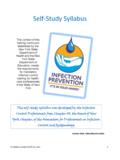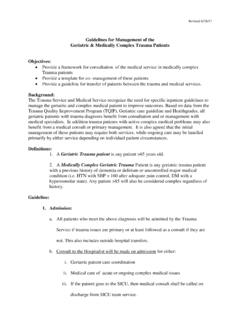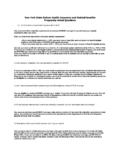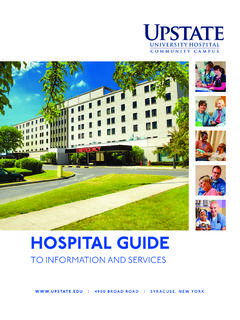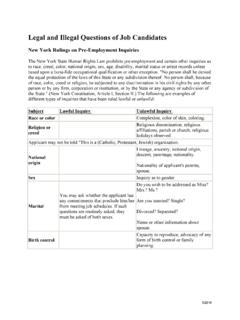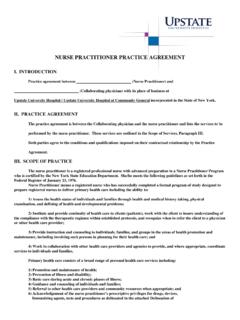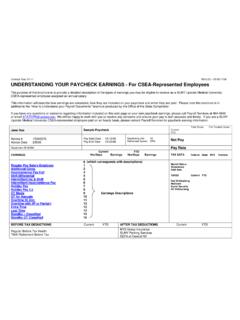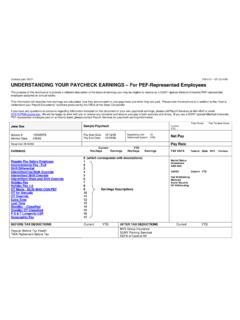Transcription of Revised: 4/2016/OTD - Upstate Medical University
1 Upstate University Health System Medication Exam - Version A. Name: Date: ID Number: Unit: Directions: Please read each question below. Choose the best response for each of the Multiple Choice and Medication Matching Questions. The Minimum Passing Score is 80%. ( points per question). Tracker Code: MEDTESTA. 1. A patient is on Synthroid (Levothyroxine). The order is 100 mcg PO daily. You have tablets that are 50 mcg in strength. How many tablets do you give? tablet B. 2 tablets C. tablets 2. It was noted in report that Mr. Smith has a potassium level of Scheduled 9 AM. medications include: Potassium Chloride 40 mEq PO BID. The Nurse will: A. Give the Potassium as ordered. B. Hold the Potassium and notify the Physician.
2 C. Call the Physician and request a higher Potassium dose. D. Ask the Patient if he feels like taking his Potassium this morning 3. Order for Mr. Jones: Metformin (Glucophage) 500 mg PO BID. Which of the following statements are true regarding Metformin A. Most often prescribed for patients with type 2 diabetes B. Suppresses hepatic production of glucose and increases insulin sensitivity C. Side effects include Diarrhea (most common) and lactic acidosis (most serious). revised : 4/ 2016 /OTD. D. All of the above 4. The physician has ordered 800 units heparin subcutaneous every day. The vial is 1000 units Heparin per ml on hand. What is the amount you will administer? A. 8 ml B. 1 ml C. ml 5. Lisinopril/Zestril is A.
3 Ace inhibitor used to treat hypertension, a common side effect is a cough B. A diuretic used to treat CHF. C. A broad spectrum antibiotic 6. Mr. Cook is being discharged from the hospital. His discharge medications include Sublingual NTG (Nitroglycerin) tablet for angina. What of the following are important to include in medication discharge instructions? A. Dissolve under tongue- do not swallow. B. When stored properly SL nitroglycerin maintains its potency until expiration date specified by the manufacturer. C. Keep tablets in original container, tightly seal container after each use D. Drug should tingle or fizzle while under tongue. E. All of above 7. Physician order: Augmentin 800 mg oral suspension PO q 12 hrs.
4 The Augmentin label reads: Augmentin 200mg/5 ml-how many ml will you give? A. 5 ml B. 20 ml C. 25 ml 8. Contraindications to aspirin include: A. Peptic ulcer disease and GI bleeding B. History of hypersensitivity reactions C. Impaired renal function. D. All of the above 9. Mr. Pitt is receiving intravenous Heparin Therapy. If necessary, which of the following medications would be ordered to reverse the effects of Heparin? A. Protamine sulfate B .Potassium Chloride C. Aminocaroic acid (Amicar). D. Vitamin K (AquaMephyton). 10. The Physician orders 15 mEq of Potassium Chloride Elixir. PO. The medication label reads: Potassium chloride 20 mEq per 15 ml oral solution The Nurse determines the Patient should receive how many mL: A.
5 20 ml ml ml 11. Which of the following drugs if overdosed is known to cause liver failure? A. Acetaminophen B. Ibuprofen C. Piroxicam D. Ketorolac 12. Mrs. Carter receives NPH Insulin 10 units every day. Which are signs of hypoglycemia? A. Sweating, dizziness, confusion and headache. B. Photo sensitivity. C. Sore throat and watery eyes. D. Fever 13. Lasix infusion is ordered for your 54 kg weight patient Dosage order is: mg/kg/hour Drip concentration: Lasix 100 mg in 100ml D5W. How many mg/hour will your patient receive? A . 20 mg/hr B. 54 mg/hr C. mg/hr (round up to 11mg/hr). 14. Patient is receiving NovaLOG (Aspart) Lispro (Humalog) insulin The nurse must ensure that: A. The patient will eat a meal within 5 to 10 minutes after taking it.
6 Lispro should be administered within 15 minutes before or immediately after a meal B. the patient will not drive or operate heavy machinery C. Patient will not make any important decisions MATCHING. A. Spironolactone B. Versed (Midazolam). C. Prilosec (Omerprazole). D. Amphotericin B. E. Lopressor/Metoprolol F. Norvasc/Amiodipine G..Diphenhydramine (Benadryl). H. Narcan (Naloxone). I. Zofran (Ondansetron): J. Warfarin (Coumadin). 15. Administered for relief of allergy symptoms, motion sickness, hives and swelling of face, tongue and lips 16. Potassium sparing diuretic that can cause dizziness, headache and skin rash 17. Relaxes coronary vascular smooth muscle, dilates coronary and peripheral arteries 18. Potent antifungal used only for severe infections due to serious adverse side effects such as anaphylaxis and nephrotoxicity 19.
7 Given to treat nausea and vomiting: Can cause prolonged QT interval putting patients at risk for Torsades de pointes 20. Proton pump inhibitor that can put patients at risk for C. Difficle associated diarrhea 21. Assess your patient for signs of unusual bruising, black tarry stools, bleeding gums, hematuria and fall in hematocrit. 22. This sedative can cause CNS depression, hypotension and respiratory distress and therefore needs careful monitoring when administered 23. Beta blocker used to treat HTN. It works by relaxing blood vessels and slowing heart rate to improve blood flow and decrease BP. 24. Reversal agent for narcotics/opiod overdose: May need frequent (about every 20. minutes) repeated doses to obtain desired reversal effect
